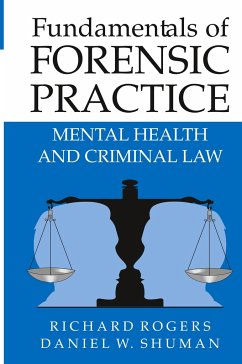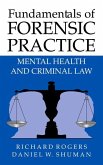Forensic psychologists and psychiatrists are increasingly asked to provide expertise to courts and attorneys in the criminal justice system. To do so effectively, they must stay abreast of important advances in the understanding of legal standards as well as new developments in sophisticated measures and the methods for their assessment. Fundamentals of Forensic Practice is designed to address the critical issues that are faced by mental health experts in their role of conducting assessments, presenting findings, and preparing for challenges to admissibility and credibility.
Uniquely practical and comprehensive, this volume operationalizes legal standards and describes empirically validated methods for their evaluation. Not only is this essential for mental health professionals, but it is equally valuable to criminal attorneys. Lawyers require both clinical knowledge and understanding of legal standards in order to prepare their own experts and to challenge those on the opposing side. For both clinical and legal experts Fundamentals of Forensic Practice offers a full view of all phases of criminal proceedings:
- Pretrial-diversion, determinations of bail, waivers of Miranda rights, and the capacity to consent to searches.
- Trial-competency to stand trial and criminal responsibility. Beyond insanity, the latter addresses mens rea, automatism, and psychological context evidence, such as battered-woman syndrome.
- Post-trial-sentencing, capital sentencing, competency to be executed, and other post-conviction issues.
Other key features include:
- Chapters on specific criminal issues in a consistent format, with comprehensive coverage of legal standards and relevant clinical methods
- Guidelines for conducting more effective forensic evaluations
- In-depth coverage of specialized assessments, eg. malingering, sexual predator cases, and the insanity defense.
- A detailed overview of direct and cross-examination strategies
This book is the second collaboration between Rogers and Shuman. As individual authors, each received the American Psychiatric Association's prestigious Guttmacher Award for their outstanding contributions to forensic psychiatry.
Uniquely practical and comprehensive, this volume operationalizes legal standards and describes empirically validated methods for their evaluation. Not only is this essential for mental health professionals, but it is equally valuable to criminal attorneys. Lawyers require both clinical knowledge and understanding of legal standards in order to prepare their own experts and to challenge those on the opposing side. For both clinical and legal experts Fundamentals of Forensic Practice offers a full view of all phases of criminal proceedings:
- Pretrial-diversion, determinations of bail, waivers of Miranda rights, and the capacity to consent to searches.
- Trial-competency to stand trial and criminal responsibility. Beyond insanity, the latter addresses mens rea, automatism, and psychological context evidence, such as battered-woman syndrome.
- Post-trial-sentencing, capital sentencing, competency to be executed, and other post-conviction issues.
Other key features include:
- Chapters on specific criminal issues in a consistent format, with comprehensive coverage of legal standards and relevant clinical methods
- Guidelines for conducting more effective forensic evaluations
- In-depth coverage of specialized assessments, eg. malingering, sexual predator cases, and the insanity defense.
- A detailed overview of direct and cross-examination strategies
This book is the second collaboration between Rogers and Shuman. As individual authors, each received the American Psychiatric Association's prestigious Guttmacher Award for their outstanding contributions to forensic psychiatry.
This is likely to be "the" book for frequent experts who want to better understand their roles in this complex environment, as well as the lawyers who utilize them. Well organized, easy to use, scholarly and practical, Fundamental of Forensic Practice is an important foundational text for training programs in forensic psychology, psychiatry, and metal health law. - William H. Reid, M.D., M.P.H., Clinical and Adjunct Professor of Psychiatry, University of Texas Health Science Center, Texas A&M College of Medicine, and Texas Tech Health Science Center









